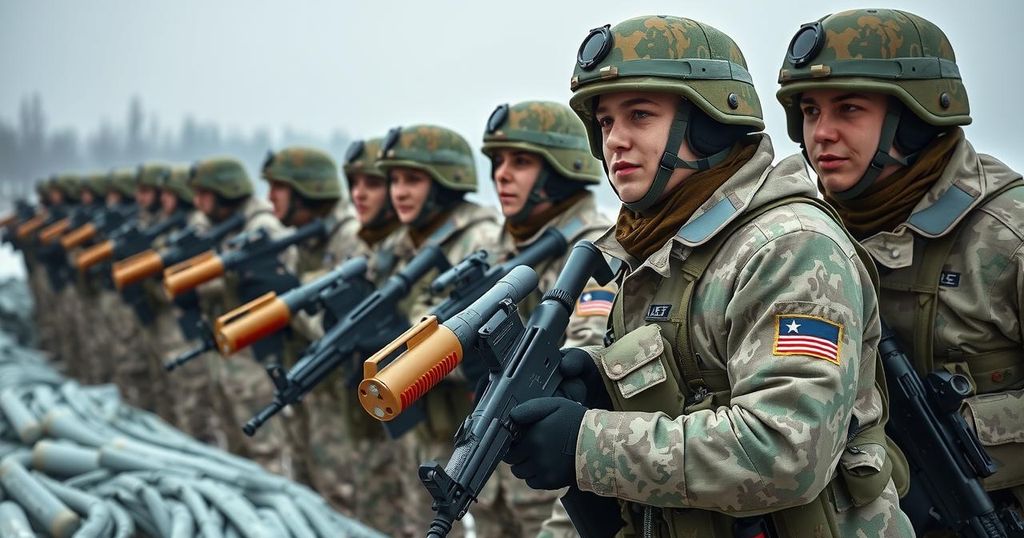North Korean Troops in Ukraine: Gaining Battlefield Experience and Strengthening Ties with Russia

North Korean troops have been deployed to support Russian forces in Ukraine, adapting quickly to battlefield conditions despite initial inexperience. Their disciplined approach contrasts with outdated tactics, leading to heavy losses. This cooperation signifies a new phase in military alliances between North Korea and Russia, raising concerns about the implications for regional stability and the potential for North Korea to refine its military capabilities.
In recent weeks, North Korean troops have been deployed to bolster Russian forces in Ukraine amid an ongoing conflict. Initially viewed with skepticism due to their lack of battlefield experience, these soldiers have quickly adapted, raising concerns about their impact on the war. Ukrainian forces, who have been engaged with Russian troops for nearly three years, now face a disciplined and methodically trained adversary. Despite their rapid acclimatization, reports indicate that North Korean soldiers have sustained heavy casualties due to outdated tactics and initial missteps on the battlefield. As the conflict unfolds, the presence of these troops signifies a marked escalation in military cooperation between North Korea and Russia.
According to reports, North Korean forces, numbering between 10,000 and 12,000, have integrated with Russian units near the Kursk border, although Moscow has not officially acknowledged their involvement. Critically, this assistance has alleviated some of the strain on Russian troops, allowing them to maintain pressure on Ukrainian defenses. Yet, the economic and military repercussions of this foreign support extend beyond the immediate conflict, with analysts warning that North Korea stands to gain invaluable combat experience and military technology that could enhance its capabilities on the global stage.
The soldiers have displayed a degree of discipline that some Ukrainian soldiers find notable; however, their traditional military methods have proven disadvantageous in a modern warfare environment characterized by drone technology and real-time reconnaissance. Thus far, North Korean troops have faced significant challenges adapting to the rapid dynamics of the battlefield, with heavy losses contributing to a difficult combat environment. The Ukrainian military, which remains observant and responsive to these developments, reports on the vulnerabilities of North Korean formations that continue to reveal themselves as the conflict progresses.
Moreover, the North Korean ideology surrounding surrender complicates the dynamics of the battlefield further. As captured enemy troops are scarce, their cultural and military indoctrination leads them to avoid capture at all costs, reinforcing a mindset that valorizes self-destruction over defeat. This ideal has significant implications for the conduct of war and the strategic calculus of conflict in the region.
The broader implications of North Korea’s battlefield experience will not only influence the course of the current Ukraine conflict but may also shape international military relations in the future. North Korea, having benefited from collaboration with Russia, may leverage its acquired expertise for global arms sales and military support.
The involvement of North Korean troops in Ukraine is a significant development in the ongoing conflict, which has pitted Ukrainian forces against Russian troops for nearly three years. The deployment of North Korean soldiers follows a military assistance agreement between Pyongyang and Moscow, highlighting their growing alliance amidst geopolitical tensions. With North Korea’s military, one of the largest standing armies in the world, relatively untested in modern combat, their participation in Ukraine marks an alarming phase in the war, raising concerns about their adaptation and effectiveness in combat situations. As the conflict evolves, the military cooperation between two historically hostile nations further complicates the security landscape in Europe, with analysts expressing the need for increased vigilance against future threats. The consequences of this engagement stretch beyond immediate military encounters, hinting at a potential shift in global military alliances and an increase in North Korea’s capabilities, which could be used to further its interests.
In conclusion, the participation of North Korean troops in Ukraine has introduced a new and concerning dynamic to the ongoing conflict between Ukraine and Russia. While initially inexperienced, the adaptation of these soldiers to battlefield conditions poses potential threats as they gain combat experience. Their presence not only bolsters Russian forces but could also shape future military strategies and alliances globally. Observers must remain vigilant as North Korea continues to evolve in its military tactics and capabilities, which may influence regional security and geopolitical stability.
Original Source: www.newspressnow.com








